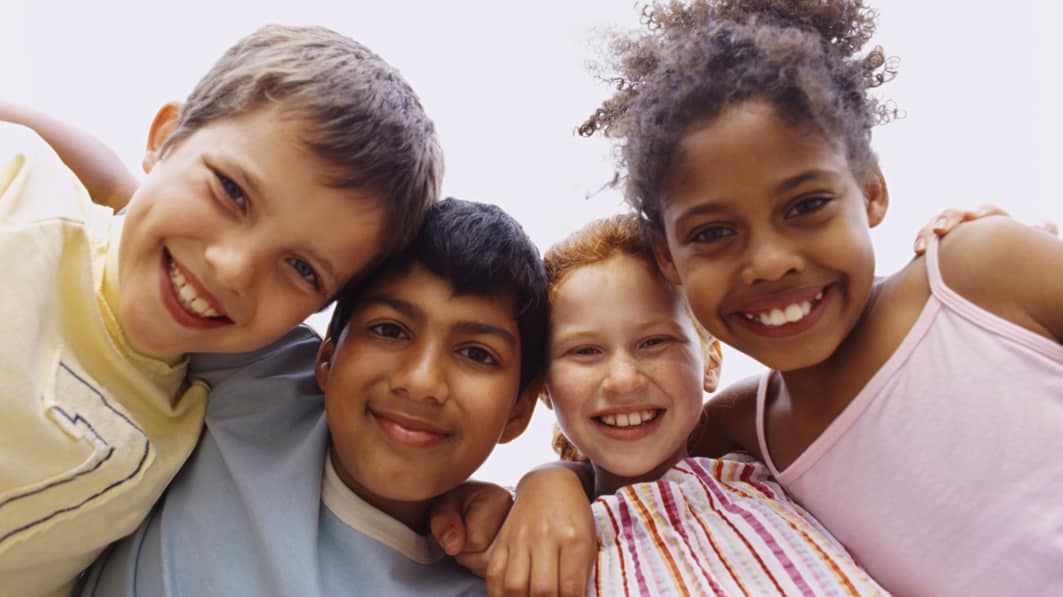Sometimes the most profound truths are tucked away in Sunday school songs. Kids all over America sing about Jesus loving all the red, brown, yellow, black and white children of the world because they are “precious in His sight.” Though Jesus loves all His children equally, generously and without favoritism, life outside of Sunday school is complicated and confusing. Racial wounds and divisions run deeper than we can wrap our arms (or hearts and minds) around, and too easily the vision of that song is left behind in a dusty closet with the forgotten flannelgraphs of yesteryear.
Candid observations
My 4-year-old, who was born in Uganda, recently asked why our president lives in a “White” house. I assumed that her emerging awareness of skin color was behind this question.
I asked, “What color should his house be?” Without hesitation she declared, “Purple!” Of course purple, because that is her favorite color.
Young children are known for their candid (and innocent) observations about weight, height, hair color, age and skin color. But the way we as parents respond to their observations could introduce pride or shame to these physically identifying features. Though some comments are inappropriate in certain situations, shushing a child who makes a remark about skin color can communicate that there is something wrong or shameful about differences. Of course pointing and “describing” others aloud is being rude or at the very least, socially awkward. But as parents, we need to go beyond the “shush” to respect our child’s observation in a way that dignifies God’s beautiful creation. This might simply mean asking a question:
- Can you think of someone you love who has [that observed characteristic]?
- How do the people in our family look the same or different from each other?
- Why might God have made us look different, not all the same?
Less Talking, More Playing
While discussions with our children are an important part of educating them about life, most of us learn far more from experience. Children learn volumes by watching parents who express negative stereotypes or by being treated poorly themselves because of their color or culture. As we consider guiding our children in paths of racial harmony, we also might need to examine our own hearts, asking God to reveal any beliefs that do not align with His.
Then, we can encourage our kids to develop friendships with children of other ethnic backgrounds so they can see past the surface. “That white boy” is now “my friend Chad” or “that black girl” is now “my friend LaTonya” or “that Latino kid” is now “my best buddy Carlos.” When we move these friends out of the category of “other,” changing the language from “they” to “we,” our children will be less likely to generalize and remain at arm’s length.
Friends Who Don’t Look Like Me?
There are geographic locations that for various reasons don’t have an abundance of racial variety. Even so, the goal of building awareness and acceptance of other ethnic backgrounds can be approached by sharing a rich collection of children’s picture books, young adult novels and films that feature admirable characters of different backgrounds. Families can also make use of local resources, such as galleries displaying diverse artwork, plays in local theaters about other cultures and town events featuring experiences not common to a family’s daily life.
As parents, we can begin communicating to our children the important contributions of individuals who do not look like us. As we delight in characters of other races and ask our children to emulate leaders of different ethnic backgrounds, our children will learn a great deal about the value of all people. This exposure also increases our children’s familiarity with other racial experiences, opening the door for them to learn more about individuals through encountering people of diverse backgrounds.
The value of interracial friendship
Interracial harmony is more than a politically correct value of our current age. It was God’s plan from the beginning. He’s building His interracial kingdom here on earth, so one day Christians from every tribe, nation and language will stand before His throne (Revelation 7:9).
Seeking and celebrating friendships outside of our ethnic background gives our children (and us) a delicious taste of God’s kingdom on earth, as it is in heaven. The danger of limiting our exposure to different races and human classes of people is the ease with which stereotyping can occur. Stereotyping assumes what the Bible does not about our identity, that we are mass-produced caricatures rather than uniquely created images of God. The Bible places the root of all of our words, actions and attitudes in our hearts, not in our physical bodies. For this reason, no externally defined characteristics make us more deserving of grace or less in need of God’s mercy.
We know that man looks at the outer appearance but God looks at the heart. Helping our children learn to value the hearts of people as God does is a gift we can give them that will be appreciated not only here on earth, but most gloriously in heaven before God’s throne.




















